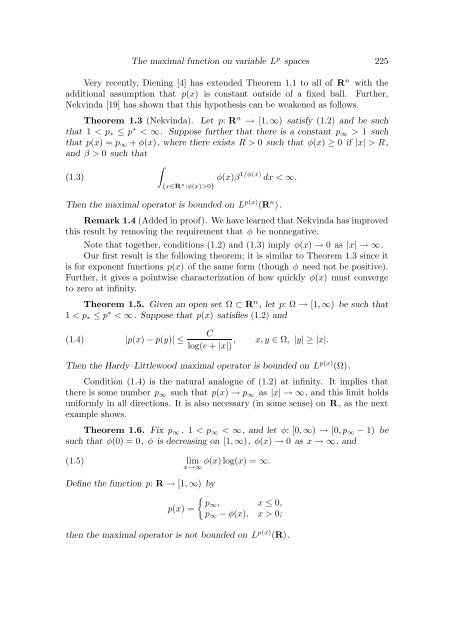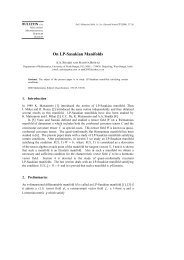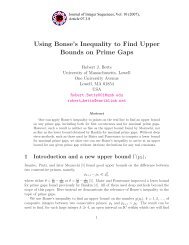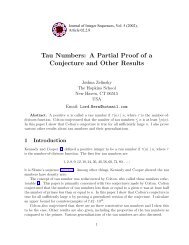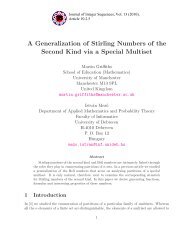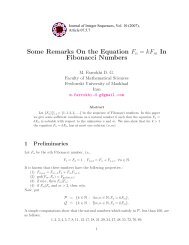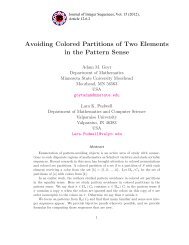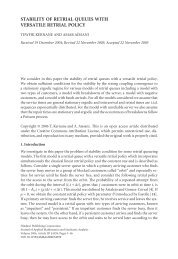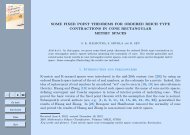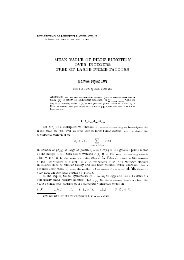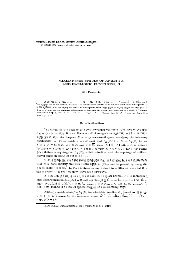THE MAXIMAL FUNCTION ON VARIABLE Lp SPACES
THE MAXIMAL FUNCTION ON VARIABLE Lp SPACES
THE MAXIMAL FUNCTION ON VARIABLE Lp SPACES
Create successful ePaper yourself
Turn your PDF publications into a flip-book with our unique Google optimized e-Paper software.
The maximal function on variable L p spaces 225Very recently, Diening [4] has extended Theorem 1.1 to all of R n with theadditional assumption that p(x) is constant outside of a fixed ball. Further,Nekvinda [19] has shown that this hypothesis can be weakened as follows.Theorem 1.3 (Nekvinda). Let p: R n → [1, ∞) satisfy (1.2) and be suchthat 1 < p ∗ ≤ p ∗ < ∞. Suppose further that there is a constant p ∞ > 1 suchthat p(x) = p ∞ + φ(x), where there exists R > 0 such that φ(x) ≥ 0 if |x| > R,and β > 0 such that∫(1.3)φ(x)β 1/φ(x) dx < ∞.{x∈R n :φ(x)>0}Then the maximal operator is bounded on L p(x) (R n ).Remark 1.4 (Added in proof). We have learned that Nekvinda has improvedthis result by removing the requirement that φ be nonnegative.Note that together, conditions (1.2) and (1.3) imply φ(x) → 0 as |x| → ∞.Our first result is the following theorem; it is similar to Theorem 1.3 since itis for exponent functions p(x) of the same form (though φ need not be positive).Further, it gives a pointwise characterization of how quickly φ(x) must convergeto zero at infinity.Theorem 1.5. Given an open set Ω ⊂ R n , let p: Ω → [1, ∞) be such that1 < p ∗ ≤ p ∗ < ∞. Suppose that p(x) satisfies (1.2) and(1.4) |p(x) − p(y)| ≤Clog(e + |x|) ,x, y ∈ Ω, |y| ≥ |x|.Then the Hardy–Littlewood maximal operator is bounded on L p(x) (Ω).Condition (1.4) is the natural analogue of (1.2) at infinity. It implies thatthere is some number p ∞ such that p(x) → p ∞ as |x| → ∞, and this limit holdsuniformly in all directions. It is also necessary (in some sense) on R, as the nextexample shows.Theorem 1.6. Fix p ∞ , 1 < p ∞ < ∞, and let φ: [0, ∞) → [0, p ∞ − 1) besuch that φ(0) = 0, φ is decreasing on [1, ∞), φ(x) → 0 as x → ∞, and(1.5) lim φ(x) log(x) = ∞.x→∞Define the function p: R → [1, ∞) by{p∞ , x ≤ 0,p(x) =p ∞ − φ(x), x > 0;then the maximal operator is not bounded on L p(x) (R).


